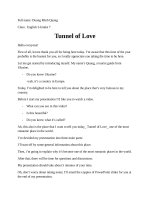The History of English In The UK Thuyết trình môn Đa dạng Tiếng Anh
Bạn đang xem bản rút gọn của tài liệu. Xem và tải ngay bản đầy đủ của tài liệu tại đây (2.43 MB, 14 trang )
The History
of
English In The UK
CONTENTS
01
02
Old English
(450-1100AD)
Middle English
(1100-1500)
03
04
Early Modern English
(Shakespearean)
Late Modern
English
OLD ENGLISH
MIDDLE ENGLISH
MODERN ENGLISH
Old English (450-1100AD)
• English is West Germanic language
originated from Anglo-Frisian dialects
brought to Britain in the mid 5th - 7th
centuries AD by Anglo-Saxon migrants.
ENGLISC
ENGLISH
• A few loanwords are borrowed from the native Romano-Britons but any
further influence from the Celtic languages (be replaced by Old English)
•
The Anglo-Saxons settled in the British Isles, their language now is called
Old English.
•
A significant subsequent influence on the shaping of Old English came
from contact with the North Germanic languages spoken by the
Scandinavian Vikings
The Anglo-Saxons
invade Britain
Middle English (1100-1500)
•
In 1066, Old English was replaced, for a
time, by Anglo-Norman as the language
of the upper classes.
•
This period the English language was
heavily influenced by Anglo-Norman,
developing into a phase known now as
Middle English.
•
As Normans are descendants of Vikings
who invaded France, Norman French was
influenced by Old Norse, and many Norse
loanwords in English came directly from
French.
•
Middle English was spoken to the late
15th century.
•
Middle English may have influenced how
an English sentence is delivered: subject,
verb, object.
Early Modern English
(Shakespearean)
•
As James I came to the throne in 1603
the English standard began to influence
what was both spoken and written in the
UK, including Middle Scots in Scotland.
•
The development of new Words, Phrases,
Gramma.
•
In 1604 first dictionary was published
Late Modern English
•
19th century, the British Empire was
going through the Industrial Revolution
which had a great impact on the
language.
•
Between 1750-1900, half of the
Revolution’s research for new inventions
were written in English thanks in part to
the contributions of the USA
Early Modern
English (1500-1800)
Late Modern English
(1800-Present)
The only difference between the Early
Modern English and the Late Modern
English is the Vocabulary
OLD ENGLISH
-
English is West Germanic language originated from Anglo-Frisian dialects
brought to Britain in the mid 5th - 7th centuries AD by Anglo-Saxon
migrants.
-
A few loanwords are borrowed from the native Romano-Britons but any
further influence from the Celtic languages( be replaced by Old English)
-
The Anglo-Saxons settled in the British Isles, their language now is called
Old English.
-
A significant subsequent influence on the shaping of Old English came
from contact with the North Germanic languages spoken by the
Scandinavian Vikings.
MIDDLE ENGLISH
-
In 1066, Old English was replaced, for a time, by Anglo-Norman as the language of
the upper classes.
-
This period the English language was heavily influenced by Anglo-Norman,
developing into a phase known now as Middle English.
-
As Normans are descendants of Vikings who invaded France, Norman French was
influenced by Old Norse, and many Norse loanwords in English came directly from
French.
-
Middle English was spoken to the late 15th century.
-
Middle English may have influenced how an English sentence is delivered: subject,
verb, object.
THANKS
Do you have any questions?









